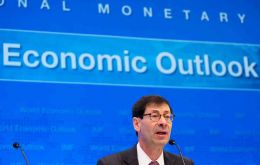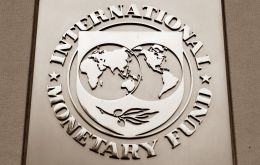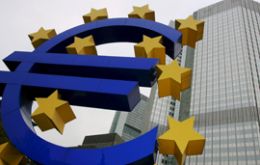MercoPress. South Atlantic News Agency
Tag: IMF World Economic Outlook
-
Thursday, November 29th 2018 - 06:56 UTC
G20: Step Up to Boost Inclusive Growth

By Christine Lagarde - As G20 leaders gather in Argentina, the global economy faces a critical juncture. We have had a good stretch of solid growth by historical standards, but now we are facing a period where significant risks are materializing and darker clouds are looming.
-
Wednesday, April 18th 2018 - 07:56 UTC
IMF semi-annual report warns of choppy waters ahead: protectionism and trade wars

While the world economy continues to show broad-based momentum, a new report released on Tuesday by the International Monetary Fund (IMF) is warning that there may be choppy seas ahead, caused by increasing protectionism or tit-for-tat trade wars.
-
Thursday, October 12th 2017 - 20:44 UTC
IMF forecasts Venezuela's inflation to reach 2.300% next year and unemployment 30%

Venezuela’s triple-digit annual inflation rate is set to jump to more than 2,300% in 2018, the highest estimate for any country tracked by the International Monetary Fund.
-
Thursday, October 6th 2016 - 12:24 UTC
Argentina forecasted to grow 2.7% in 2017, but his year is of contraction and costly reforms, says IMF

The latest IMF World Economic Outlook report anticipates that Argentina’s economic contraction will amount to 1.8% this year, fiercer than the IMF’s last forecast of a 1% decline. Inflation, meanwhile, will hover at around 40%, above government estimates, the Fund said.
-
Wednesday, October 8th 2014 - 03:43 UTC
IMF lowers Latam growth forecasts: declining exports and domestic constraints

The International Monetary Fund cut its global economic growth forecasts for the third time this year, warning of weaker growth in core Euro zone countries, Japan and big emerging markets like Brazil.
-
Tuesday, April 17th 2012 - 20:04 UTC
IMF estimates less growth (3.5%) and higher prices (7.4%) for Uruguay in 2012

Uruguay growth estimate has been downed for 2012 while prices will be higher, according to the latest IMF World Economic Outlook released on Tuesday. The economy is set to grow 3.5% down from 4.2% while prices will climb to 7.4% compared to the 6.5% estimate of the previous WEO last September.
-
Wednesday, January 25th 2012 - 07:54 UTC
IMF forecasts 2012 slower growth in Latam, but above the world average

Latin American growth this year should stay under the 4% estimated previously at 3.6% since the region is susceptible to the slowing down of the world’s economy and increasing risks of the financial crisis on the Euro zone, according to the IMF World Economic Outlook released Tuesday.
-
Tuesday, September 20th 2011 - 21:48 UTC
IMF lowers global 2011/12 growth estimates, but warns things can get worse

The global economic recovery is slowing, with world growth projected at 4% in both 2011 and 2012, down from over 5% in 2010, the IMF said in its latest forecast. And even this lowered projection counts on a lot going well.
-
Tuesday, September 20th 2011 - 21:27 UTC
Euro-zone growth forecasts plummet: 1.6% this year and 1.1% in 2012

The IMF cut its growth forecast for the 17-nation Euro zone by nearly half a percentage point to 1.6% in 2011 and even weaker conditions are seen for next year with growth of just 1.1%. Currently the single currency region is scarcely growing at a 0.25% annual rate.
-
Wednesday, August 31st 2011 - 00:53 UTC
IMF slashes growth forecasts for US and Euro zone; warns against higher rates

The IMF has slashed its growth forecasts for the United States and said the Federal Reserve and the European Central Bank must be ready to ease policy.
